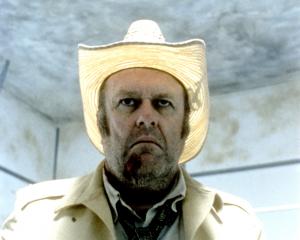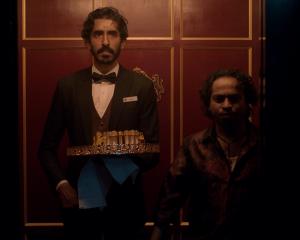Steven Spielberg's screen biography, Lincoln, shows America's most beloved president had a sense of humour, writes Roger Moore.
He was America's most beloved president, a Mount Rushmore icon, a great humanitarian with a bit of Mark Twain's frontier humorist about him. Yes, Abraham Lincoln knew how to tell a joke.
''Humour was an essential part of his temperament, even given his melancholy spirit,'' says historian Doris Kearns Goodwin, author of Team of Rivals: The Political Genius of Abraham Lincoln, which is the basis for the screenplay of Steven Spielberg's screen biography, Lincoln.
''I was thrilled that they got his sense of humour into the film. As Lincoln himself said, he `whistled off sadness.' His ability to tell these humorous stories as a way of getting across a point was obviously something I fell in love with, writing about him. Lincoln was an inveterate storyteller. He had a huge supply of them. He'd learned them and told them during his years on the stump or in court in Illinois.''
Actor Daniel Day-Lewis ''seemed to fall under that spell, too,'' Goodwin marvels.
''He starts telling a story as Abe, and his whole face gets transformed.''
Books are filled with Lincoln's homilies, about ''the man who murdered his parents, then pleaded for mercy on the grounds that he was an orphan''. And so is Lincoln - fables, one-liners, even a dirty joke about a Revolutionary War patriot (Ethan Allen) having the last laugh on some Brits who figured on insulting George Washington.
But that doesn't mean the people who worked under Abraham Lincoln suffered gladly his stand-up comic's timing, his ''That reminds me of a story'' moments. Goodwin was thrilled to see the humorous anecdotes, many of which spice up her biography of the man, included in the film.
She was even more amused to see screenwriter Tony Kushner, director Spielberg and the actors playing Lincoln's cabinet, his ''team of rivals,'' show ''how irritated those around him got when he'd start in on a story. Bruce McGill, as Edwin Stanton, was hilarious. And on the money.''
Stanton was Lincoln's embattled Secretary of War, a man with blood and responsibility on his hands, ''a stern, irascible and grumpy man,'' says McGill, who started with Goodwin's book and plunged into the research on Lincoln and his cabinet.
''He and Lincoln clashed over things like pardoning deserters from the army. Lincoln wanted to pardon them all. Stanton didn't feel that was any way to maintain an army and keep it motivated - letting guys just get away with walking away.''
Such a man might not have the patience to hear another of ''The Rail-Splitter's'' cracker-barrel stories. He'd interrupt, roll his eyes and insult the commander in chief, pretty much to his face.
''Stanton would get red in the face over these distractions,'' Goodwin says, chuckling.
''And so does Bruce!''
Stanton, a longtime critic of Lincoln before serving under him, ''wasn't afraid of telling Lincoln he disagreed with him, loudly,'' McGill learned in his research. Whatever Lincoln was to become to future generations, Stanton dealt with the man, not the saint.
''As you see in the film, some subordinate would come to Lincoln and say, `Stanton says that's wrong and that you're a jackass','' McGill says.
''And Lincoln would ponder for a minute and go, `Well, we'd better go see him. Because he's usually right'.''
Stanton, a character ''whose fuse is lit and relit'' (Ty Burr, The Boston Globe) is winning the native Texan McGill (who first came to fame as ''D-Day'' in the classic '70s fraternity comedy Animal House,) warm reviews. Those include the most important notice, from Goodwin herself.
''He really absorbed Stanton,'' she says.
''Stanton was a guy who was always impatient, even with the president. Especially with the president.''
McGill, who has had scene-stealing turns in comedies (Matchstick Men), thrillers (Collateral) and straight dramas, credits Day-Lewis' reputation for meticulous research for making a heavy biography about a dark period at the end of the Civil War so light. Knowing Day-Lewis would be ''in character'' as Lincoln every second on the set, McGill decided he would, too. All their chats would be as ''Mr President'' and ''Mr Secretary.''
''I took the opportunity, the first day on the set, to apologise for a slight Stanton had given Lincoln. I'd been lead lawyer on a case that Lincoln had done all the research on. But when he got to Cincinnati to try it, this 28 year-old junior lawyer, we didn't treat him well at all ... basically shunned him.
''So he walks in the room, and Steven was adjusting the camera. I was standing there for a few minutes with this actor I admire so much. So I said, `Mr President, I'd just like to take this opportunity to apologise for that business in Cincinnati. We sorely misjudged you and I regret it to this day.' You could always see `Daniel' peeking out behind the eyes of Mr Lincoln, and his eyes brightened. And he said, `Well, if I can forgive that, I can forgive anything'.''
Maybe the apology never happened, McGill says. But it could have. And Lincoln would have made a joke about it.
Knowing that Stanton would, on the night of Lincoln's death, offer the president's most famous, pithiest eulogy, perhaps he's right.
''Now he belongs to the ages.''
The nominations
Lincoln has been nominated for 12 Academy Awards. They are:
• Best motion picture
• Achievement in directing (Steven Spielberg)
• Performance by an actor in a leading role (Daniel Day-Lewis)
• Performance by an actor in a supporting role (Tommy Lee Jones)
• Performance by an actress in a supporting role (Sally Field)
• Adapted screenplay (Tony Kushner)
• Original score (John Williams)
• Achievement in production direction
• Achievement in cinematography (Janusz Kaminski)
• Achievement in costume design (Joanna Johnston)
• Achievement in film editing
• Achievement in sound mixing.












